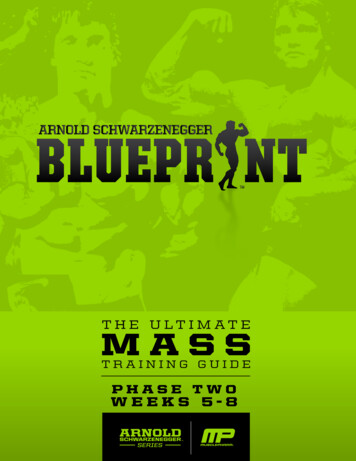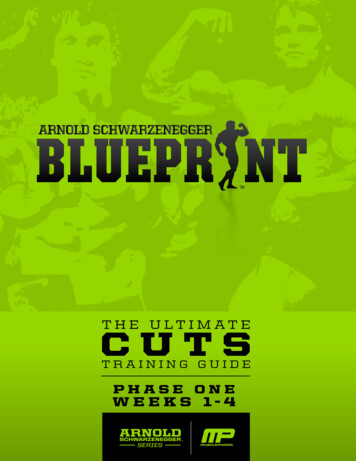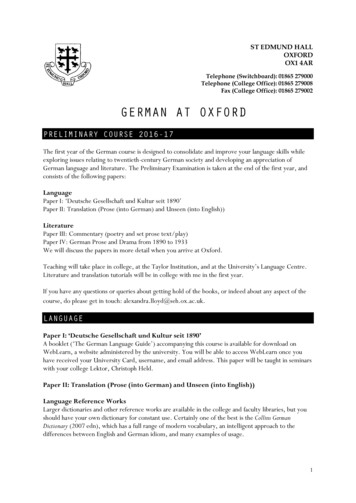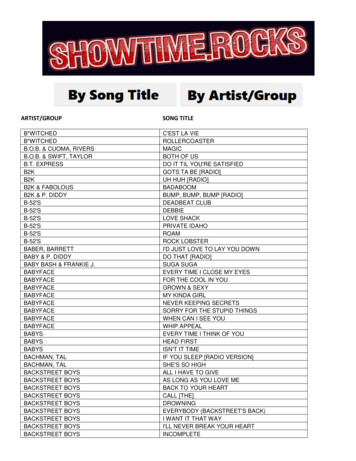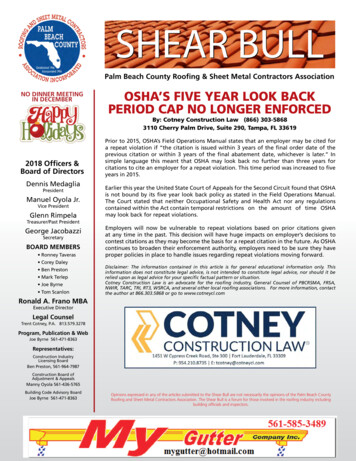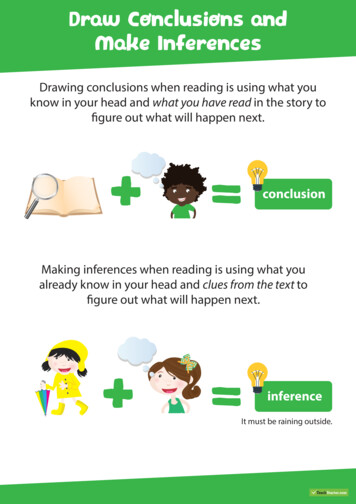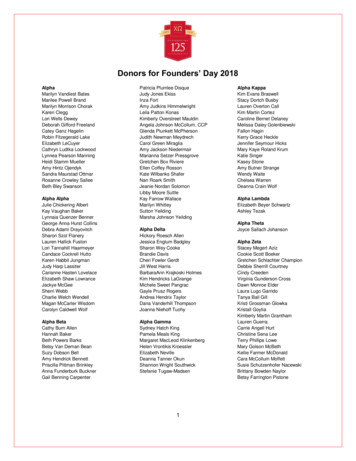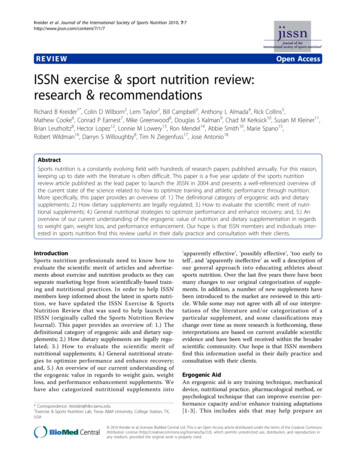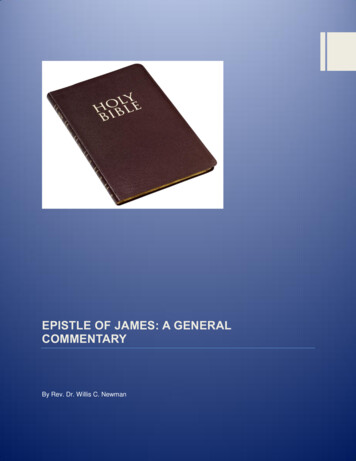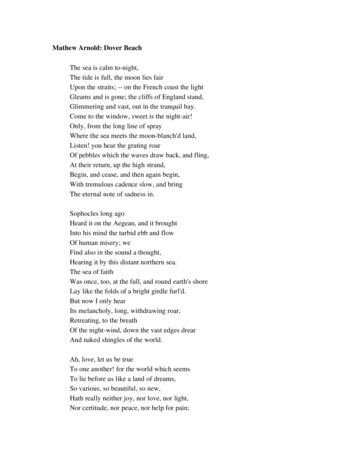
Transcription
Mathew Arnold: Dover BeachThe sea is calm to-night,The tide is full, the moon lies fairUpon the straits; -- on the French coast the lightGleams and is gone; the cliffs of England stand,Glimmering and vast, out in the tranquil bay.Come to the window, sweet is the night-air!Only, from the long line of sprayWhere the sea meets the moon-blanch'd land,Listen! you hear the grating roarOf pebbles which the waves draw back, and fling,At their return, up the high strand,Begin, and cease, and then again begin,With tremulous cadence slow, and bringThe eternal note of sadness in.Sophocles long agoHeard it on the Aegean, and it broughtInto his mind the turbid ebb and flowOf human misery; weFind also in the sound a thought,Hearing it by this distant northern sea.The sea of faithWas once, too, at the full, and round earth's shoreLay like the folds of a bright girdle furl'd.But now I only hearIts melancholy, long, withdrawing roar,Retreating, to the breathOf the night-wind, down the vast edges drearAnd naked shingles of the world.Ah, love, let us be trueTo one another! for the world which seemsTo lie before us like a land of dreams,So various, so beautiful, so new,Hath really neither joy, nor love, nor light,Nor certitude, nor peace, nor help for pain;
And we are here as on a darkling plainSwept with confused alarms of struggle and flight,Where ignorant armies clash by night.Robert Browning: Porphyria's LoverThe rain set early to-night,The sullen wind was soon awake,It tore the elm-tops down for spite,And did its worst to vex the lake:I listened with heart fit to break.When glided in Porphyria; straightShe shut the cold out and the storm,And kneeled and made the cheerless grateBlaze up, and all the cottage warm;Which done, she rose, and from her formWithdrew the dripping cloak and shawl,And laid her soiled gloves by, untiedHer hat and let the damp hair fall,And, last, she sat down by my sideAnd called me. When no voice replied,She put her arm about my waist,And made her smooth white shoulder bareAnd all her yellow hair displaced,And, stooping, made my cheek lie there,And spread, o'er all, her yellow hair,Murmuring how she loved me--sheToo weak, for all her heart's endeavor,To set its struggling passion freeFrom pride, and vainer ties dissever,And give herself to me forever.But passion sometimes would prevail,Nor could to-night's gay feast restrainA sudden thought of one so paleFor love of her, and all in vain:So, she was come through wind and rain.Be sure I looked up at her eyes
Happy and proud; at last I knewPorphyria worshipped me; surpriseMade my heart swell, and still it grewWhile I debated what to do.That moment she was mine, mine, fair,Perfectly pure and good: I foundA thing to do, and all her hairIn one long yellow string I woundThree times her little throat around,And strangled her. No pain felt she;I am quite sure she felt no pain.As a shut bud that holds a bee,I warily oped her lids: againLaughed the blue eyes without a stain.And I untightened next the tressAbout her neck; her cheek once moreBlushed bright beneath my burning kiss:I propped her head up as before,Only, this time my shoulder boreHer head, which droops upon it still:The smiling rosy little head,So glad it has its utmost will,That all it scorned at once is fled,And I, its love, am gained instead!Porphyria's love: she guessed not howHer darling one wish would be heard.And thus we sit together now,And all night long we have not stirred,And yet God has not said a word!Lord Byron: The Destruction of SennacheribThe Assyrian came down like the wolf on the fold,And his cohorts were gleaming in purple and gold;And the sheen of their spears was like stars on the sea,When the blue wave rolls nightly on the Galilee.
Like the leaves of the forest when summer is green,That host with their banners at sunset were seen:Like the leaves of the forest when autumn hath blown,That host on the morrow lay withered and strown.For the Angel of Death spread his wings on the blast,And breathed in the face of the foe as he passed;And the eyes of the sleepers waxed deadly and chill,And their hearts but once heaved, and forever grew still!And there lay the steed with his nostril all wide,But through it there rolled not the breath of his pride;And the foam of his gasping lay white on the turf,And cold as the spray of the rock-beating surf.And there lay the rider distorted and pale,With the dew on his brow, and the rust on his mail:And the tents were all silent, the banners alone,The lances unlifted, the trumpets unblown.And the widows of Ashur are load in thier wail,And the idols are broke in the temple of Baal;And the might of the Gentile, unsmote by the sword,Hath melted like snow in the glance of the Lord!Arthur Hugh Clough: Say Not the Struggle Naught AvailethSAY not the struggle naught availeth,The labor and the wounds are vain,The enemy faints not, nor faileth,And as things have been they remain.If hopes were dupes, fears may be liars;It may be, in yon smoke concealed,Your comrades chase e'en now the fliers,And, but for you, possess the field.
For while the tired waves, vainly breaking,Seem here, no painful inch to gain,Far back, through creeks and inlets making,Comes silent, flooding in, the main.And not by eastern windows only,When daylight comes, comes in the light,In front, the sun climbs slow, how slowly,But westward, look, the land is bright.W.E. Henley: InvictusOut of the night that covers me,Black as the Pit from pole to pole,I thank whatever gods may beFor my unconquerable soul.In the fell clutch of circumstanceI have not winced nor cried aloud,Under the bludgeonings of chanceMy head is bloody, but unbowed.Beyond this place of wrath and tearsLooms but the horror of the shade,And yet the menace of the yearsFinds, and shall find me, unafraid.It matters not how strait the gate,How charged with punishments the scroll,I am the master of my fate:I am the captain of my soul.John Keats: On First Looking Into Chapman's HomerMuch have I travell'd in the realms of gold,And many goodly states and kingdoms seen;
Round many western islands have I beenWhich bards in fealty to Apollo hold.Oft of one wide expanse had I been toldThat deep-brow'd Homer ruled as his demesne;Yet never did I breathe its pure sereneTill I heard Chapman speak out loud and bold.Then I felt like some watcher of the skiesWhen a new planet swims into his ken;Or like stout Cortez, when with eagle eyesHe star'd at the Pacific--and all his menLook'd at each other with a wild surmise-Silent upon a peak in Darien.Omar Khayyam: Rubaiyat -- Selections (Edward Fitzgerald's Translation)Come, fill the Cup, and in the fire of SpringYour Winter-garment of Repentance fling:The Bird of Time has but a little wayTo flutter---and the Bird is on the Wing.11Here with a Loaf of Bread beneath the Bough,A Flask of Wine, a Book of Verse---and ThouBeside me singing in the Wilderness--And Wilderness is Paradise enow.25Why, all the Saints and Sages who discuss'dOf the Two Worlds so learnedly, are thrustLike foolish Prophets forth; their Words to ScornAre scatter'd, and their Mouths are stopt with Dust.26Oh, come with old Khayyam, and leave the Wise
To talk; one thing is certain, that Life flies;One thing is certain, and the Rest is Lies;The Flower that once has blown for ever dies.27Myself when young did eagerly frequentDoctor and Saint, and heard great ArgumentAbout it and about: but evermoreCame out by the same Door as in I went.28With them the Seed of Wisdom did I sow,And with my own hand labour'd it to grow:And this was all the Harvest that I reap'd--"I came like Water, and like Wind I go."37Ah, fill the Cup:---what boots it to repeatHow Time is slipping underneath our Feet:Unborn TO-MORROW, and dead YESTERDAY,Why fret about them if TO-DAY be sweet!46For in and out, above, about, below,'Tis nothing but a Magic Shadow-show,Play'd in a Box whose Candle is the Sun,Round which we Phantom Figures come and go.48While the Rose blows along the River Brink,With old Khayyam the Ruby Vintage drink:And when the Angel with his darker DraughtDraws up to Thee---take that, and do not shrink.
49'Tis all a Chequer-board of Nights and DaysWhere Destiny with Men for Pieces plays:Hither and thither moves, and mates, and slays,And one by one back in the Closet lays.51The Moving Finger writes; and, having writ,Moves on: nor all thy Piety nor WitShall lure it back to cancel half a Line,Nor all thy Tears wash out a Word of it.King David: Psalm 23- King James Version1 A Psalm of David. The LORD is my shepherd; I shall not want.2 He maketh me to lie down in green pastures: he leadeth me beside the stillwaters.3 He restoreth my soul: he leadeth me in the paths of righteousness for hisname's sake.4 Yea, though I walk through the valley of the shadow of death, I will fearno evil: for thou art with me; thy rod and thy staff they comfort me.5 Thou preparest a table before me in the presence of mine enemies: thouanointest my head with oil; my cup runneth over.6 Surely goodness and mercy shall follow me all the days of my life: and Iwill dwell in the house of the LORD for ever.Rudyard Kipling: IfIf you can keep your head when all about youAre losing theirs and blaming it on you,If you can trust yourself when all men doubt you,But make allowance for their doubting too;
If you can wait and not be tired by waiting,Or being lied about, don't deal in lies,Or being hated, don't give way to hating,And yet don't look too good, nor talk too wise:If you can dream - and not make dreams your master;If you can think - and not make thoughts your aim;If you can meet with Triumph and DisasterAnd treat those two impostors just the same;If you can bear to hear the truth you've spokenTwisted by knaves to make a trap for fools,Or watch the things you gave your life to broken,And stoop and build 'em up with wornout tools:If you can make one heap of all your winningsAnd risk it on one turn of pitch-and-toss,And lose, and start again at your beginningsAnd never breathe a word about your loss;If you can force your heart and nerve and sinewTo serve your turn long after they are gone,And so hold on when there is nothing in youExcept the Will which says to them: 'Hold on!'If you can talk with crowds and keep your virtue,Or walk with kings - nor lose the common touch,If neither foes nor loving friends can hurt you,If all men count with you, but none too much;If you can fill the unforgiving minuteWith sixty seconds' worth of distance run Yours is the Earth and everything that's in it,And - which is more - you'll be a Man my son!
Sir Henry Newbolt: Vitai LampadaThere's a breathless hush in the Close to-nightTen to make and the match to win -A bumping pitch and a blinding light,An hour to play and the last man in.And it's not for the sake of a ribboned coat,Or the selfish hope of a season's fame,But his Captain's hand on his shoulder smote"Play up! play up! and play the game!"The sand of the desert is sodden red, -Red with the wreck of a square that broke;-The Gatling's jammed and the colonel dead,And the regiment blind with dust and smoke.The river of death has brimmed his banks,And England's far, and Honor a name,But the voice of a schoolboy rallies the ranks,"Play up! play up! and play the game!"This is the word that year by yearWhile in her place the School is setEvery one of her sons must hear,And none that hears it dare forget.This they all with a joyful mindBear through life like a torch in flame,And falling fling to the host behind-"Play up! play up! and play the game!"Dorothy Parker: Razors Pain YouRazors pain you;Rivers are damp;Acids stain youAnd drugs cause cramp;Guns aren't lawful;Nooses give;
Gas smells awful;You might as well live.Edwin Arlington Robinson: Richard CoryWhenever Richard Cory went down town,We people on the pavement looked at him;He was a gentleman from sole to crown,Clean favored, and imperially slim.And he was always quietly arrayed,And he was always human when he talked,But still he fluttered pulses when he said"Good morning"--and he glittered when he walked.And he was rich--yes, richer than a king,And admirably schooled in every grace;In fact, we thought that he was everythingTo make us wish that we were in his place.So on we worked, and waited for the light,And went without the meat, and cursed the bread,And Richard Cory, one calm summer night,Went home and put a bullet through his head.Edwin Arlington Robinson: Mr. Flood's PartyOld Eben Flood, climbing alone one nightOver the hill between the town belowAnd the forsaken upland hermitageThat held as much as he should ever knowOn earth again of home, paused warily.The road was his with not a native near;And Eben, having leisure, said aloud,For no man else in Tilbury Town to hear:
"Well, Mr. Flood, we have the harvest moonAgain, and we may not have many more;The bird is on the wing, the poet says,And you and I have said it here before.Drink to the bird." He raised up to the lightThe jug that he had gone so far to fill,And answered huskily: "Well, Mr. Flood,Since you propose it, I believe I will."Alone, as if enduring to the endA valiant armor of scarred hopes outworn.He stood there in the middle of the roadLike Roland's ghost winding a silent horn.Below him, in the town among the trees,Where friends of other days had honored him,A phantom salutation of the deadRang thinly till old Eben's eyes were dim.Then, as a mother lays her sleeping childDown tenderly, fearing it may awake,He sat the jug down slowly at his feetWith trembling care, knowing that most things break;And only when assured that on firm earthIt stood, as the uncertain lives of menAssuredly did not, he paced away,And with his hand extended paused again:"Well, Mr. Flood, we have not met like thisIn a long time; and many a change has comeTo both of us, I fear, since last it wasWe had a drop together. Welcome home!"Convivially returning with himself,Again he raised the jug up to the light;And with an acquiescent quaver said:"Well, Mr. Flood, if you insist, I might."Only a very little, Mr. Flood-For auld lang syne. No more, sir; that will do."
So, for the time, apparently it didAnd Eben apparently thouht so too;For soon among the silver lonelinessOf night he lifted up his voice and sang,Secure, with only two moons listening,Until the whole harmonious landscape rang-"For auld lang syne." The weary throat gave out,The last word wavered, and the song was done.He raised again the jug regretfullyAnd shook his head, and was again alone.There was not much that was ahead of him,And there was nothing in the town below-Where strangers would have shut the many doorsThat many friends had opened long ago.Edwin Arlington Robinson: Luke HavergalGo to the western gate, Luke Havergal,There where the vines cling crimson on the wall,And in the twilight wait for what will come.The leaves will whisper there of her, and some,Like flying words, will strike you as they fall;But go, and if you listen, she will call.Go to the western gate, Luke HavergalLuke Havergal.No, there is not a dawn in eastern skiesTo rift the fiery night that's in your eyes;But there, where western glooms are gatheringThe dark will end the dark, if anything:God slays Himself with every leaf that flies,And hell is more than half of paradise.No, there is not a dawn in eastern skiesIn eastern skies.Out of a grave I come to tell you this,
Out of a grave I come to quench the kissThat flames upon your forehead with a glowThat blinds you to the way that you must go.Yes, there is yet one way to where she is,Bitter, but one that faith may never miss.Out of a grave I come to tell you thisTo tell you this.There is the western gate, Luke Havergal,There are the crimson leaves upon the wall,Go, for the winds are tearing them away,Nor think to riddle the dead words they say,Nor any more to feel them as they fall;But go, and if you trust her she will call.There is the western gate, Luke HavergalLuke Havergal.Edwin Arlington Robinson: The MillThe miller's wife had waited long,The tea was cold, the fire was dead;And there might yet be nothing wrongIn how he went and what he said:"There are no millers any more,"Was all that she heard him say;And he had lingered at the doorSo long it seemed like yesterday.Sick with a fear that had no formShe knew that she was there at last;And in the mill there was a warmAnd mealy fragrance of the past.What else there was would only seemTo say again what he had meant;And what was hanging from a beamWould not have heeded where she went.
And if she thought it followed her,She may have reasoned in the darkThat one way of the few there wereWould hide her and would leave no mark:Black water, smooth above the weirLike starry velvet in the night,Though ruffled once, would soon appearThe same as ever to the sight.William Shakespeare: Hamlet's SoliloquyTo be, or not to be: that is the question:Whether 'tis nobler in the mind to sufferThe slings and arrows of outrageous fortune,Or to take arms against a sea of troubles,And by opposing end them? To die: to sleep;No more; and by a sleep to say we endThe heart-ache and the thousand natural shocksThat flesh is heir to, 'tis a consummationDevoutly to be wish'd. To die, to sleep;To sleep: perchance to dream: ay, there's the rub;For in that sleep of death what dreams may comeWhen we have shuffled off this mortal coil,Must give us pause: there's the respectThat makes calamity of so long life;For who would bear the whips and scorns of time,The oppressor's wrong, the proud man's contumely,The pangs of despised love, the law's delay,The insolence of office and the spurnsThat patient merit of the unworthy takes,When he himself might his quietus makeWith a bare bodkin? who would fardels bear,To grunt and sweat under a weary life,But that the dread of something after death,The undiscover'd country from whose bournNo traveller returns, puzzles the willAnd makes us rather bear those ills we have
Than fly to others that we know not of?Thus conscience does make cowards of us all;And thus the native hue of resolutionIs sicklied o'er with the pale cast of thought,And enterprises of great pith and momentWith this regard their currents turn awry,And lose the name of action.--Soft you now!The fair Ophelia! Nymph, in thy orisonsBe all my sins remember'd.William Shakespeare: Macbeth Quotations* Had I but died an hour before this chance,I had lived a blessed time; for, from this instant,There's nothing serious in mortality;All is but toys: renown, and grace is dead;The wine of life is drawn, and the mere leesIs left this vault to brag of.* O! full of scorpions is my mind, dear wife!* Give sorrow words; the grief that does not speakWhispers the o'er-fraught heart, and bids it break.* I have lived long enough: my way of lifeIs fall'n into the sere, the yellow leaf;And that which should accompany old age,As honour, love, obedience, troops of friends,I must not look to have; but in their stead,Curses, not loud but deep, mouth-honour, breath,Which the poor heart would fain deny, but dare not.* I have almost forgot the taste of fears.The time has been, my senses would have cooledTo hear a night-shriek; and my fell of hairWould, at a dismal treatise, rouse and stir,As life were in 't.
* Tomorrow, and tomorrow, and tomorrow,Creeps in this petty pace from day to day,To the last syllable of recorded time;And all our yesterdays have lighted foolsThe way to dusty death. Out, out , brief candle !Life's but a walking shadow, a poor playerThat struts and frets his hour upon the stage,And then is heard no more; it is a taleTold by an idiot, full of sound and fury,Signifying nothing.* I 'gin to be aweary of the sun,And wish the estate o' th' world were now undone.* They have tied me to a stake: I cannot fly,But, bear-like, I must fight the coarse.* Turn, hell-hound, turn !Of all men else I have avoided thee;But get thee back, my soul is too much chargedWith blood of thine already.* Let fall thy blade on vulnerable crests;I bear a charmed life, which must not yieldTo one of woman born.* Despair thy charm;And let the angel whom thou hast still servedTell thee, Macduff was from his mother's wombUntimely ripped.* Accursed be that tounge that tells me so,For it hath cowed my better part of man;* I will not yield,To kiss the ground before young Malcolm's feet,And to be baited with the rabble's curse.
Though Birnam wood be come to Dunsinane,And thou opposed, being of no woman born,Yet I will try the last; before my bodyI throw my warlike shield; lay on, Macduff;And damned be him that first cries, "Hold, enough!"William Shakespeare: Sonnet 29When, in disgrace with fortune and men's eyes,I all alone beweep my outcast stateAnd trouble deaf heaven with my bootless criesAnd look upon myself and curse my fate,Wishing me like to one more rich in hope,Featured like him, like him with friends possess'd,Desiring this man's art and that man's scope,With what I most enjoy contented least;Yet in these thoughts myself almost despising,Haply I think on thee, and then my state,Like to the lark at break of day arisingFrom sullen earth, sings hymns at heaven's gate;For thy sweet love remember'd such wealth bringsThat then I scorn to change my state with kings.PARAPHRASEWhen I've run out of luck and people look down on me,All alone I lament my fate as an outcast*And pray to heaven but my cries go unheardAnd look at myself, cursing my fate,Wishing I were like one* who had more hope in lifeWishing I looked like him; wishing I were surrounded by friends,I desire this man's art and that man's range*,I am least contented with what I used to enjoy most.But in this mood almost despising myself,I think of you and then my state of sadnessLike the lark at the break of day, risesFrom the gloomy earth and I sing hyms to heaven;
For thinking of your love brings such happiness to mindThat then I would not change my state with kings.William Shakespeare: Sonnet 66Tired with all these, for restful death I cry,As, to behold desert a beggar born,And needy nothing trimm'd in jollity,And purest faith unhappily forsworn,And gilded honour shamefully misplaced,And maiden virtue rudely strumpeted,And right perfection wrongfully disgraced,And strength by limping sway disabled,And art made tongue-tied by authority,And folly doctor-like controlling skill,And simple truth miscall'd simplicity,And captive good attending captain ill:Tired with all these, from these would I be gone,Save that, to die, I leave my love alone.PARAPHRASE1. Tired with all these, for restful death I cry,1. Tired with all these exhausted, wearied, disgusted withall these - then follows the list of social evils with whichhe is tired. Possibly with a suggestion of attired with, in thesense that the evils cling to him like clothing, and he cannotdivest himself of them.2. As to behold desert a beggar born,2. As as, for example, all these following. desert a deservingperson, a worthwhile person. In each succeeding line either praiseworthyor degenerate qualities are personified. Thus needy nothing, purest faith,gilded honour, maiden virtue, right perfection etc. all refer to theperson or persons endowed with such characteristics. a beggar born
born into poverty.3. And needy nothing trimm'd in jollity,3. needy nothing a nonentity who is needy because he is lacking inall good qualities. At first glance it appears that the phrase suggeststhe opposite of that intended, for being in a list of socially desirabletypes whom society has downtrodden, one automatically accepts it as beingof the correct type to fit the general flow of the poem i.e. one of thebetter and praiseworthy examples. Further consideration shows that thisis not so, and needy nothing turns out to be one of the nasties who hasmanaged to get himself kitted out in the latest fashion, no doubt atthe expense of desert in the line above .trimm'd in jollity (undeservingly) done up in frivolous and expensiveclothes and ornaments.4. And purest faith unhappily forsworn,4. purest faith one who exhibits trust and trustworthiness; one who ispure in heart. unhappily through evil fortune, unluckily; wretchedly.forsworn tricked by false promises, betrayed.5. And gilded honour shamefully misplac'd,5. As in line 3, gilded honour is not an example of virtue ill-treated,but of unworthiness well rewarded. Gilded honour stands for the pompand paraphernalia of office and authority, the gold regalia of office,but here it is misplaced, because it has been bestowed on those who arenot fit to receive it. 6. And maiden virtue rudely strumpeted,6. maiden virtue unblemished virtue; an innocent maiden. rudelystrumpeted forced to become a whore, proclaimed a whore. Figuratively,virtue is forced into evil ways. The resemblance of the word strumpetto trumpet hints at the possibility of public shaming of the innocent.7. And right perfection wrongfully disgrac'd,7. right perfection genuine, honest perfection.
wrongfully sinfully, evilly, unjustly.8. And strength by limping sway disabled8. strength the strength of knowing the right course of action.limping sway influence, which is typified by a crippled, shufflingfigure working behind the scenes. The irony is that strength, which ishale and hearty, is disabled by influence and corruption, which is limpingand crippled, but nevertheless manages to make strength like himself. KDJsees a possible reference to the authority of the ageing Elizabeth inrestricting the activities of young male courtiers, for example theEarl of Essex in 1600/01. But it is unlikely that Shakespeare would haveneeded to look to the very top of society for examples of young talentand enterprise suppressed by the aged and infirm. Youth in any age canfeel itself repressed by precedent, tradition, and the influence andauthority of those already in power. In Elizabethan England, being ofthe right family and having contacts with those who could pull stringswas vital for success, and many talented youths must have discoveredthat their prospects were severly blighted by the conventions of thetimes and the limited prospects for advancement.9. And art made tongue-tied by authority,9. art skill, knowledge. A person who possesses these. The word wasless often applied to what we would call the creative arts.authority a person in authority. SB mentions that this could referto censorship, which did operate in Elizabethan times, albeit rathererratically.10. And folly, doctor-like, controlling skill,10. folly stupidity, ignorance. doctor-like - as an academicdoctor; pretending to be learned. Skill is used by Shakespeare of thephysician's art also, so the reference could here be to a doctorof medicine.controlling restraining, exercising authority over, restricting, hampering.skill - used in a general sense to signify those who have knowledge,those who are skilled in a branch of science. But perhaps the reference
is more to an academic situation, in which a person flaunting academicdress controls those who are more knowledgeable than him, but who do nothave such a high academic standing.11. And simple truth miscalled simplicity,11. simple truth plain truth, unadorned truth.miscalled wrongfully named.simplicity stupidity, idiocy.12. And captive good attending captain ill:12. captive having been captured; enslaved, having no freedom;attending serving in a menial capacity; taking instruction from.captain ill evil (an evil person) in a position of authority. The titlereferred to a military rank, but was often used in a more general sense tomean a military person in high authority,13. Tir'd with all these, from these would I be gone,13. Wearied with all this graft and corruption, I wish to escape from it all.14. Save that, to die, I leave my love alone.14. Save that except that.to die by dying; if I die.I leave my love alone I abandon my love and leave him or her defenceless;the only thing that I regret leaving is my love.Song: One MeatballA little man walked up and down,He found an eating place in town,He read the menu through and through,To see what fifteen cents could do.One meatball, one meatball,
He could afford but one meatball.He told the waiter near at hand,The simple dinner he had planned.The guests were startled, one and all,To hear that waiter loudly call, "What,"One meatball, one meatball?Hey, this here gent wants one meatball."The little man felt ill at ease,Said, "Some bread, sir, if you please."The waiter hollered down the hall,"You gets no bread with one meatball."One meatball, one meatball,Well, you gets no bread with one meatball."The little man felt very bad,One meatball was all he had,And in his dreams he hears that call,"You gets no bread with one meatball."One meatball, one meatball,Well, you gets no bread with one meatball."Song: Stormy WeatherDon't know why,there's no sun up in the skyStormy weatherSince my [gal/man] and Iain't togetherKeeps raining all the timeLife is bare,gloom and misery everywhereStormy weather
Just can't get my poor self togetherI'm weary all the timeWhen s/he went awayThe blues walked in to get meAnd if s/he stays awayMy rocking chair will get meAll I do is pray, the lord above will let meWalk in the sun once moreCan't go on, everything I had is goneStormy weatherSince my [gal/man] I ain't togetherKeeps raining all the timeDon't know why,there's no sun up in the skyStormy weatherSince my [gal/man] and Iain't togetherKeeps raining all the timeLife is bare,gloom and misery everywhereStormy weatherJust can't get my poor self togetherI'm weary all the timeI'm weary all the timeI'm weary all the timeAlfred, Lord Tennyson: UlyssesIt little profits that an idle king,By this still hearth, among these barren crags,Match'd with an aged wife, I mete and doleUnequal laws unto a savage race,That hoard, and sleep, and feed, and know not me.I cannot rest from travel: I will drinkLife to the lees: All times I have enjoy'd
Greatly, have suffer'd greatly, both with thoseTh
Robert Browning: Porphyria's Lover The rain set early to-night, The sullen wind was soon awake, It tore the elm-tops down for spite, And did its worst to vex the lake: I listened with heart fit to break. When glided in Porphyria; straight She shut the cold out and the storm, And kneeled and m
